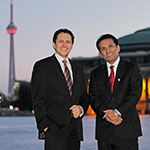It’s quite an impressive résumé. Lou Nieto started at Quaker Oats in 1981 and became a brand manger just two years later. In 1987 he moved to Kraft, became senior manager in 1991, and director in 1992. That led to top positions at Mission Foods Co., Dean Foods, and ConAgra. Nieto spent his entire 30-year career in top positions at food manufacturers before serious health issues forced him to retire. At the time of his retirement in 2009, he led 6,000 employees at a company known for Hebrew National, Healthy Choice, and other top brands. Now, Nieto sits on multiple corporate boards, which he advises through his LLC, Nieto Advisory. The Chicago-area resident shares with HE, some valuable insights gained during his impressive career and the first four years of retirement.
Stand by your principles
Nieto followed three principals while climbing the corporate ladder, which kept him grounded on his way to the top. First, a leader must articulate a vision in a clear and concise way. Second, a leader must show respect to everyone in the organization. Third, a leader must inspire by making each member feel like a valuable part of the team.
One specific experience established Nieto’s stance on respect. Upon joining a new company, he noticed that lower- and mid-level employees refused to make eye contact with him. An assistant confided in Nieto that the workers had been trained to fear executives. After someone e-mailed him about a particular vice president known for his temper tantrums, Nieto confronted that person’s division manager with an ultimatum: he would be fired if he ever acted out again. When he did act out, Nieto fired him. “I sent a signal to the organization that we were building a new culture of respect,” Nieto says.
Weigh each decision
Another time, Nieto and his colleagues were forced to face some tough budgeting decisions and had resolved to close two manufacturing plants. Nieto’s father once worked in manufacturing and had seen his own share of downsizing. “My father taught me to really understand how each decision might impact real people,” he says. Before closing the plants, Nieto visited each facility to see the faces of the workers whose jobs were on the line. “Having met the people who would lose their jobs, I knew what it cost, but I was still confident it was the right decision,” he says.
Take some risks
In 2005, Nieto was trusted with stabilizing business at a struggling ConAgra before being able to sell the company two years later. He had previously accomplished something similar at Dean’s, where high demand and low output were leading to huge shortfalls. What’s critical in restructuring, he says, is fast movement and decisive action. “You tolerate risk in certain situations because in some cases, the price you pay for moving slowly is more than the price you pay for mistakes,” he says. Good executives know how to lead with a clear head in both good times and bad.
Find new paths
In 2009, an unexpected health issue forced Nieto to retire at the top of his game. He stabilized and now sits on the corporate boards of Auto Zone and Ryder. He also contributes to charitable causes and enjoys spending quality time with his wife and three daughters. “I struggled with ending my career early,” he says. “When you step off the merry-go-round after 30 years, it’s scary to start a different stage of life.”
Four years later, Nieto sees his forced retirement as a blessing in disguise. He’s attended countless sporting events, award ceremonies, and parent-teacher meetings at his daughters’ schools. He helped start a Latino Jesuit school and supports educational initiatives for urban African-American communities. He also rediscovered a passion for reading and learning. “I’ve realized that I still have a lot to give even though I’m no longer technically on the job,” Nieto says. “I’m still able to find causes and situations where I can use the skills I developed in my former life and I’m thankful for that.”

